- Home
- Sarah Zettel
Dust girl
Dust girl Read online
Dust girl
Sarah Zettel
Callie LeRoux has lived all her life in small town Kansas. She thinks she knows all there is to know about herself and her mother. But with the coming of the biggest dust storm in history, Callie finds out there is much more to her family, her history and the world outside Slow Run than she ever guessed. Secrets and magics plunge Callie into danger with only her own nerve and the hobo boy Jack Holland to help, and Jack has his own secrets that might destroy them both…
Sarah Zettel
Dust girl
The first book in the American Fairy Trilogy series, 2012
To the memories of
Woody Guthrie and Huddie “Lead Belly” Ledbetter:
I never did see you, see you
I never did get to meet you
I just heard your story, story
And I just want to sing your name.
1
In a Month Called April, a County Called Gray
Once upon a time, I was a girl called Callie. That, however, ended on Sunday, April 14, 1935. That was the day the worst dust storm ever recorded blew across Kansas. That was the day Mama vanished.
That was the day I found out I wasn’t actually a human being.
Now, mind, I didn’t know any of this when my cough woke me up that morning. Hot, still air, damp with my own breath, pressed against my face, and my tongue felt as stiff and strange as the sole of somebody else’s shoe inside my mouth. Unwinding the muslin scarf, which Mama made me wear over my mouth and nose when I slept, didn’t help much. It was already too hot and too dusty to breathe easy. Through the layers of sackcloth and muslin that we used for curtains, I could see the sun hovering like a rotten orange over the straight black Kansas horizon. Dust carried by the wind scratched and pattered against the windowpane, trying to get inside.
I lived with my mama in the Imperial Hotel in Slow Run, Kansas. Once, it was the finest hotel in the county, with its Moonlight Room, and the smoking lounge all decked out in red velveteen and gold fringe, and a ladies’ parlor sporting an Italian marble fireplace so big I could stand up in it. Even empty, it was the biggest, grandest home imaginable.
Slow Run itself was not a place you ever heard of, unless you had to live there or stop overnight on your way somewhere else. Used to be a lot of people did stay overnight. A lot of things used to happen in Slow Run. The trains used to bring in travelers and take out carloads of wheat from the grain elevator. Mama used to make plenty of money running the hotel her parents started.
It used to rain. But now Kansas was part of the Dust Bowl, along with Oklahoma, Texas, Arkansas, and Indiana, and had been for five, maybe six years. I could just about remember the time when I looked out my window to see the green wheat rippling all around the straight lines of clapboard buildings that made up Slow Run. Now there was nothing but the blowing dirt under that rotten orange sun.
I jumped off my brass bed, ran to the bathroom, and switched on the tap. Water came out in a thin gray stream, but at least it came. It didn’t always. I drank a little to rinse my mouth. It tasted like old tin. I plugged the basin drain and ran about an inch of water into the sink so I could scrub my face and hands with the little piece of store-bought soap. I wiped myself down with the washrag so the soap wouldn’t get into the basin water. I got store-bought soap because of my good skin, Mama said. My skin was cream-colored and soft with not too many freckles. But that meant I had to take special care of it, and always wear a hat and gloves when I went outdoors so I wouldn’t turn brown. I had good eyes too, she said, a stormy blue-gray color that people said turned steel gray when I got mad. My hair was another story. My black hair was my mother’s worst enemy. “So coarse,” she’d mutter while she combed the tangles out. She’d wash it in lye water and lemon juice, when we could get them. But even when we couldn’t, it had to be brushed a hundred strokes every night and kept done up in tight braids so it would be nicely wavy.
“When you’re older, Callie, we’ll put it up in a proper chignon,” Mama told me. “It’ll be so pretty. Until then, we’ll just have to do our best.”
Doing our best meant a lot of things to Mama. It meant keeping ourselves and the hotel clean, and minding our manners even when there was no one to see or care. It meant being patient, even on the worst days when my lungs felt so heavy from breathing in the blow dust all the time that they dragged my whole body down.
My workday dress used to be yellow, but wash soap and dust had turned it a kind of pale brown. I looped my scarf over my arm and carefully carried my wash water down the short, narrow hallway. Our staff quarters at the back of the hotel had two bedrooms, the kitchen, and a little sitting room. As expected, the kitchen was empty. Mama would be somewhere in the main part of the hotel, trying to chase Gray County back outside.
I scooped one cup of water out of my basin and poured slow drips onto the tomatoes growing in soup cans on the windowsill. The rest went into the tin bucket by the door for the chickens. Before opening the door, though, I pulled on my canvas work hat and gloves and tied my scarf securely over my face.
As soon as I stepped off the porch, sweat prickled on the back of my neck and at the edges of my scarf. The stems from our dead garden rattled in the hot wind. A brown grasshopper clung to one broken twig, waiting for a chance to get into the house and between my sheets.
I tried not to hate the hoppers, even when they got into the water basin or my shoes. The only reason we still had chickens was that the birds could live on hoppers and the little green worms that crawled out of the sunbaked fence posts.
The hens fought each other over the water while I helped myself at the nesting boxes. We were lucky today. Six warm brown eggs went into my pockets. My mouth watered. Maybe we could sell a few at the store for flour, or milk, or even butter, if there was any at Van Iykes’s Mercantile. The mercantile was the last store in town. There used to be a choice between Van Iykes’s and Schweitzer’s Emporium. But last week, Mr. and Mrs. Schweitzer locked their doors, tossed the key in the dust, climbed into their truck with their babies, Sophie and Todd, and drove away. Mama and I stood out on the porch and watched them leave.
“Cowards,” I muttered, because I didn’t want to think about how much I wanted to leave with them.
As if that thought was a signal, my cough started up again, in sharp little bursts. It hurt, but not as much as knowing Mama would never leave Slow Run.
The truth was, Mama was kind of crazy, and had been for years, but there was nothing anybody could do about it. Especially not me. She acted normal about most things. About everything, really, except my papa. My papa, Daniel LeRoux, had run out on Mama before I was born. He’d promised he would come back, and she’d promised she would wait for him. That promise kept us both pegged to this place while the state of Kansas dried up and blew away.
The wind swirled dust across the tops of my shoes and tugged at my skirts.
Look shhhhaaaarrrrp, said a slow, soft voice. Look shhhhaaaarrrrp. Shhhheeee’s nearrrr…
“Who’s that!” I spun around. But there was nobody there.
Shhhheeee’s nearrrr… shhhheeee’ssss closssse…
“Casey Wilkes, if that’s you…” I ran around the corner of the hotel.
From here, the whole of Slow Run spread out stark and plain: the square clapboard and brick buildings marking out the straight, dust-filled streets; the four church steeples weathered a pale gray; the dusty tumbleweeds leaning lazily against the walls. Farther out, sagging barbed-wire fences ran alongside the black lines of the railroad tracks all the way to the hazy outline of the grain elevator, with the spindly windmills standing sentry in between.
What there wasn’t was any person close enough to whisper in my ear. Except I could still hear the soft, deep, strangely beautif
ul voice.
Closssser, closssser. Look shhhhaaaarrrrp…
I turned and ran for the kitchen door.
2
I Got the Dust Pneumonia in My Lungs
“Calliope! What on earth…?” cried Mama.
I shoved the kitchen door shut behind me and leaned against it, wheezing hard, pain clamping down on my lungs and stomach with each breath.
“What’s the matter, Callie honey?” Mama shook out the match she’d been using to light the stove and came over to undo my scarf.
Mama had never been a big woman, and work and heat had worn her thin and bled the color from her golden hair. Nothing had touched her eyes, though. Those were still big and blue with dark lashes, the eyes of a little girl in an old woman’s face.
“Snake,” I croaked as Mama pulled my scarf off. “Rattler… in the yard. Startled me.”
“Good heavens, that’s all we need.” Mama stepped around me and opened the door, peering out into the haze. “Well, I can’t see anything now. We’ll just have to hope it stays out there.” She shut the door firmly and put the latch on it, as if that would make a difference. “Did you get anything from the hens?”
“Six eggs.” I set my pretty brown prizes on the counter. Fortunately, they’d survived all my charging around.
“Well done!” She clapped her long hands, and her blue eyes sparkled. “We’ll save three for supper.” Mama selected the eggs with care and laid them in a bowl in the icebox. There was no ice, of course, but it made a good pantry because the dust had a hard time weaseling its way through the sealed door. “See if there’s any bread left in the box, Callie.”
There was, a hard brown heel wrapped in layers of cheesecloth and newspaper. I sliced it carefully so it wouldn’t crumble. Humming “The Midnight Special” under her breath, Mama dropped the bread into the cast-iron skillet, where it could fry in the grease alongside the other three eggs. Reverend Schauenbergh said it wasn’t a decent song, but it was her favorite. She used to sing it to me as a lullaby when I was a baby, and just hearing it could make me feel better, especially when it came with the smell of Mama’s cooking.
Mama was an amazing cook. Everything she put her hand to turned out delicious. Back when the hotel was open, she’d fixed whole banquets: roast beef and roast turkey with heaps of creamy mashed potatoes, and all kinds of breads and puddings and congealed salads. She could trim up a wedding cake with sugar flowers you’d swear were just picked in the garden. When she brought her pies to the county fair, the other ladies just gave up and went home. Grandma once said it had been Mama’s cooking that really caught my father’s attention. It was one of the few times Grandma mentioned him at all.
The smell of Mama’s good cooking filled the kitchen, and my stomach squeezed so tight it forced a fresh barking cough out of my lungs.
“Oh, honey!” Mama dropped her fork and ran to me, rubbing my back firmly. “Let it go, Callie.”
I tried. My lungs strained and coughed, and strained and coughed, but there wasn’t any room to get the air in. Mother whacked me hard between my shoulders. A spill of bitter brown goop splatted onto the table.
Now I could breathe, long, harsh gasps. Mama took me in her arms and held me tight. Her embrace was hot and she smelled like sweat, dust, and grease, but I wanted her. I wanted to crawl inside her mind to find that place that let her smile and sing through the worst dust storms. If I had to be crazy, I wanted my mama’s kind of crazy, because she was never afraid.
“It’s all right now, Callie,” she murmured, sitting me down at the table. She put a cup with an inch of water in front of me.
“Sip it slow, honey. You’ll feel better in a minute.”
My cheeks and eyes burned with shame for having spit up all over the table where we had to eat. Mama said nothing, just wiped up my mess with one of her cleaning rags. The water was warm and tasted stale, but it felt good sliding down my raw throat.
Mama forked our breakfast onto clean plates and set them on the table. She’d given me two whole eggs and most of the bread. My throat hurt at the thought of trying to swallow the hard bread.
“I’m not that hungry, Mama.”
“Nonsense.” She sliced her fried bread into tiny, ladylike bits with her tarnished knife. “You’re a growing girl. When your father gets back, I don’t want him thinking I’ve starved you.”
Mention of my father took away what was left of my appetite, but I picked up my fork and knife and cut through my eggs. Golden yolk ran across the white china and leached into the fried bread. If I didn’t look up, I wouldn’t have to see how Mama’s eyes emptied out like they always did when she thought about my papa.
Daniel LeRoux had been a piano player. He didn’t come through Slow Run on the train like most people, or even in a Model T Ford. He drove up to the front door in a brand-new buggy pulled by a team of matched horses. He said he was out of Kansas City and looking for work. He could play all the new dances, so my grandparents let him stay.
Mama said he had a wonderful smile, that he could sing like an angel and play like the devil. “But you don’t need to tell anybody else that,” she whispered to me. “We’ll just let people go on thinking their fool thoughts. We’ll just keep your papa our secret, all right?”
I’d promised, and I kept that promise, not because Papa was a jazz musician, which was bad enough, or because he’d never married Mama, which was worse. But because of the thing we never, ever talked about.
My papa was a black man. That made me a black girl. That meant there was a whole world of things I couldn’t do, and places I couldn’t go. I couldn’t sit in the Moonlight Room, or go to the white school, or try on clothes at the emporium, or ride in a Pullman car on the train, if we ever went anywhere. If anybody knew about Papa, and I got caught doing any of those things, I could end up in jail. Or dead.
That was the real reason Mama just let people go on thinking my father had been an Irish traveling salesman named Mike McGinty, and called me Callie McGinty to anybody official. But it was Daniel LeRoux’s ring she never took off, and Daniel LeRoux she insisted was coming back.
A knock sounded at the door. Mama wiped her mouth and folded her napkin neatly before she got up to answer it.
“Mornin’, Maggie.” Dr. Kenny shook the dust off the brim of his Stetson hat before he stepped inside. He was a big gray man with cheeks that sagged loose around his face.
“Good morning, Doctor,” Mama said, as polite as if welcoming in a king. “Won’t you sit down? I’m sorry, the coffee’s not done yet…” There was no coffee, not even chicory. A glance at the stove with its single pan would tell Dr. Kenny as much.
“Nothing for me, thank you,” he said. “I just came by to say…” He cleared his throat. “I wanted to tell you we’re leaving.”
“Oh?” Mama raised her eyebrows, as if she couldn’t think of a single reason why someone would do such an odd thing.
“I hoped we’d be able to stick it out, but… well, it’s been five years since the county’s seen a drop of rain, and there’s the children to think of, and Mrs. Kenny’s got cousins in Chicago. So…”
He was talking to me. I put my fork down quietly, even while egg and bread tried to come back up my sore throat.
“Well. Chicago.” Mama’s voice wavered just the tiniest bit. “I do hope you’ll write to us. I’d love to hear about Chicago, and I’m sure Callie would too. Wouldn’t you, Callie?”
“Yes, please.” But inside I was thinking, The doctor’s going. That’s got to be the last straw. There can’t be anything left if even he’s going.
He looked at me like there was a whole lot he wanted to say, starting with “I’m sorry.” He cleared his throat again. “I wanted to give Callie’s lungs one more listen before we left.”
“That’s very kind, Dr. Kenny. Thank you.”
He put his black bag down on the table and got out his stethoscope. He polished its steel bell carefully with a huge white handkerchief before he laid it against my chest.
/>
“Breathe deep, Callie.”
It hurt, and I coughed, which hurt worse, and I coughed again. Dr. Kenny sat back, pulling the stems out of his ears and shaking his head.
“Maggie…” He looked Mama straight in the eye. “I’m telling you for the last time, you’ve got to get this girl out of here.”
“We’ll manage fine, Doctor. Callie wears her scarf every night and when she goes outside…”
“This is the dust pneumonia, Maggie. Scarf or no scarf, her lungs are filling up with dirt, and pretty soon she won’t be able to breathe at all.”
“Her father will be back soon and we’ll all go together.” Mama laid the words down like bricks, one on top of the other, blocking off the only door.
The doctor’s sagging face twisted tight. “If it’s money, Maggie, I can loan you the train fare. You pay us back when you get settled someplace, maybe in St. Louis, or Atlanta…”
“That’s very kind of you, but we’ll be perfectly all right.”
Dr. Kenny bowed his head. “I do hope so, Maggie. I do.” He dug a bottle of soothing syrup out of his bag and handed it to Mama. She nodded her thanks, and he gathered up his things.
“You be a good girl and mind your mother, Callie.” His eyes met mine once more. He was sorry. Maybe even real sorry. But we both knew that wasn’t going to change anything.
The door closed hard behind him.
Mama sat back down at her place. “Don’t you worry, Callie.” She sliced up the last of her toast and dipped it neatly into the drying egg yolk. “We’ll be fine.”
My stomach heaved. Maybe she’d be fine, but I wouldn’t. I had the dust pneumonia. The dust was going to keep right on filling up my lungs until I smothered and died. Then my crazy mama would bury me next to my grandparents in the Methodist churchyard and keep right on waiting for a man who ran out on her. On us.

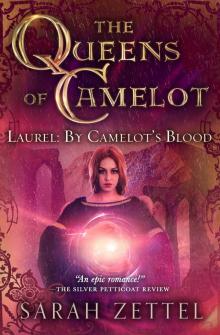 Laurel
Laurel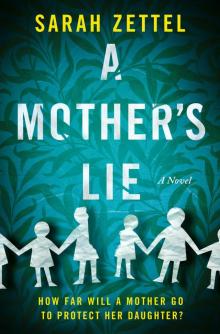 A Mother's Lie
A Mother's Lie Playing God
Playing God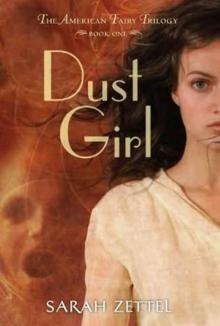 Dust girl
Dust girl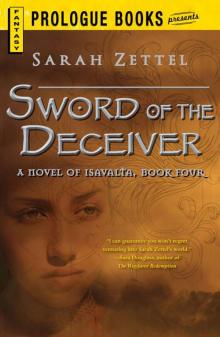 Sword of the Deceiver
Sword of the Deceiver Let Them Eat Stake: A Vampire Chef Novel
Let Them Eat Stake: A Vampire Chef Novel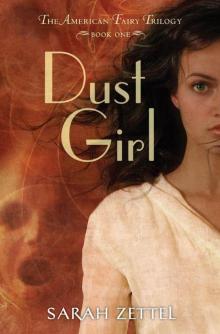 Dust Girl: The American Fairy Trilogy Book 1
Dust Girl: The American Fairy Trilogy Book 1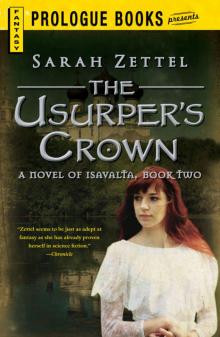 The Usurper's Crown
The Usurper's Crown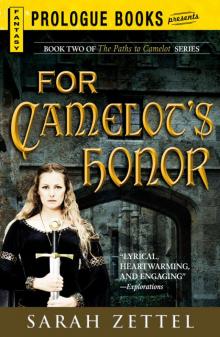 For Camelot's Honor
For Camelot's Honor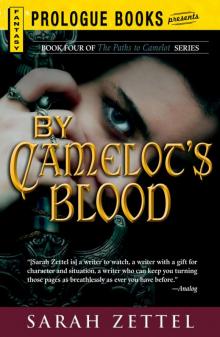 Camelot's Blood
Camelot's Blood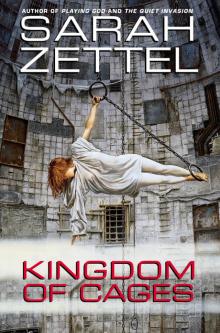 Kingdom of Cages
Kingdom of Cages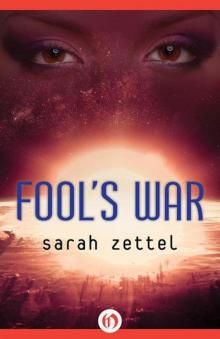 Fool's War
Fool's War Golden Girl
Golden Girl A Sorcerer’s Treason
A Sorcerer’s Treason The Firebird's Vengeance
The Firebird's Vengeance A Taste of the Nightlife
A Taste of the Nightlife Assassin's Masque (Palace of Spies Book 3)
Assassin's Masque (Palace of Spies Book 3)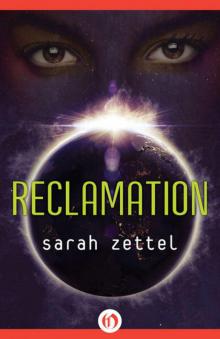 Reclamation
Reclamation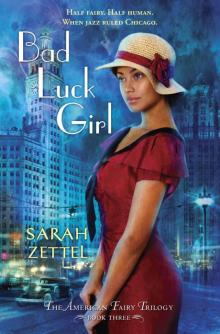 Bad Luck Girl
Bad Luck Girl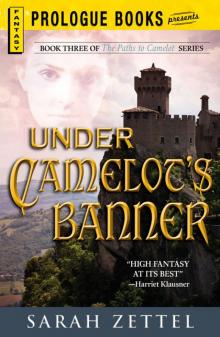 Under Camelot's Banner
Under Camelot's Banner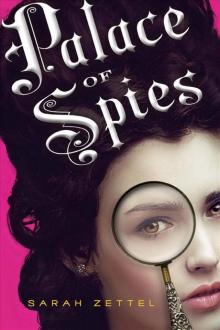 Palace of Spies
Palace of Spies Dangerous Deceptions
Dangerous Deceptions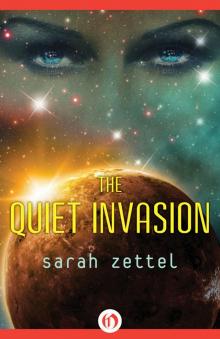 Quiet Invasion
Quiet Invasion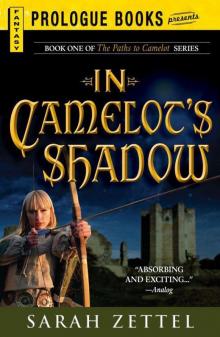 In Camelot’s Shadow: Book One of The Paths to Camelot Series (Prologue Fantasy)
In Camelot’s Shadow: Book One of The Paths to Camelot Series (Prologue Fantasy)